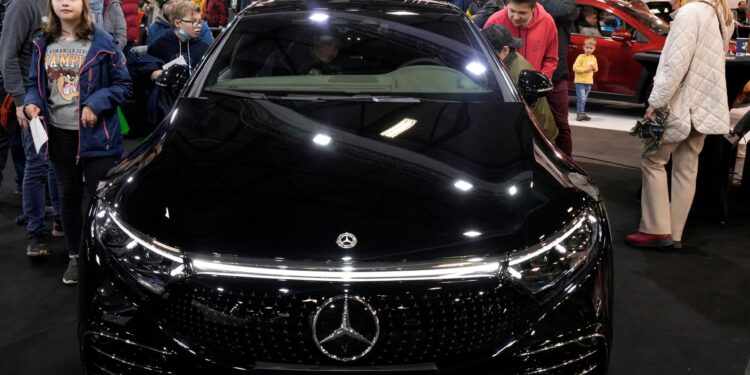In a move to mitigate looming EU tariffs on Chinese electric cars, China has proposed reducing its current tariffs on large motor vehicles coming from the EU, estimated at 15%.
Bloomberg said that the offer – which aims to benefit luxury car manufacturers in Germany – was discussed between Chinese Minister of Commerce Wang Wentao and his German counterpart Robert Habeck during a meeting in Beijing.
The proposed tariff reduction aims to attract German luxury car makers, including Mercedes-Benz and BMW, which could greatly benefit from lower tariffs on their exports to China.
The discussions come at a critical time, with the European Union considering increasing tariffs on Chinese electric vehicles by up to 48% later this year.
Attractive offer
German luxury car manufacturers are expected to achieve huge gains if the proposed tariff cuts are implemented, according to the agency.
Beijing’s strategic initiative is seen as an attempt to leverage Germany’s influential auto industry to pressure Berlin against supporting electric vehicle tariffs proposed by the European Union.
The German automobile industry – which is considered one of the largest industries in the European Union – has great influence, and Beijing’s proposal aims to exploit this influence to negotiate more favorable terms for Chinese electric car exports, according to what the agency stated.
German Chancellor Olaf Scholz affirmed his government’s desire to reach a negotiated solution, stressing the need for progress by China.
“There is still time before the temporary tariffs are imposed from July 4,” Schulz said in a speech to the business lobby conference in Berlin.
Negotiations and political pressure
The ongoing negotiations between the European Union and China reflect a complex interaction between economic interests and political strategies.
While the European Commission confirms that the proposed tariffs are based on legal conclusions from an in-depth study of government subsidies provided by Beijing, China argues that this step is protectionist and not based on objective criteria.
The European Commission and the Chinese Ministry of Commerce have not yet commented on the proposed tariff cuts.
Deborah Elms, head of trade policy at the Heinrich Foundation, indicated in an interview with Bloomberg that the European Union could postpone the imposition of customs duties pending the results of the negotiations.
She added, “As long as both sides make sufficient progress toward an answer, it is possible to stop the clock.”
The negotiations come as the European Union prepares to impose new temporary tariffs on Chinese electric vehicles next July.
Political and economic repercussions
Bloomberg notes that the Chinese proposal and the ongoing negotiations have broader political and economic implications, and by proposing tariff reductions, China aims to send a signal to other major economies.
In recent months, Chinese government departments and media – controlled by the Chinese Communist Party and other state-affiliated groups – have escalated threats targeting various sectors, including French brandy, Spanish pork, and German large-engined vehicles.
This tactic, according to the agency, aims to turn discussions into trade negotiations and put pressure on EU member states bilaterally.



